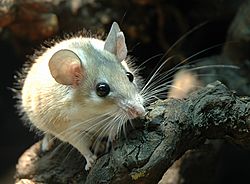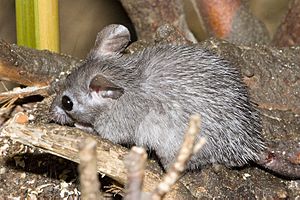Spiny mouse facts for kids
Quick facts for kids Spiny MouseTemporal range: Early Pliocene - Recent
|
|
|---|---|
 |
|
| Acomys dimidiatus | |
| Scientific classification | |
| Kingdom: | |
| Phylum: | |
| Class: | |
| Order: | |
| Superfamily: | |
| Family: | |
| Subfamily: | |
| Genus: |
Acomys
I. Geoffroy, 1838
|
The spiny mouse is a type of rodent. It belongs to a group of animals called the genus Acomys. These small mammals are often called spiny mice because of their special fur.
Spiny mice have stiff hairs on their backs. These hairs feel like the spines of a hedgehog. This is how they got their name! They also have bare, scaly tails. Even though they look like common pet mice, scientists think spiny mice might be more closely related to gerbils.
Contents
Spiny Mice as Pets: What to Know
Spiny mice come from the deserts of Africa. People in other parts of the world, like the United States, sometimes keep them as exotic pets. In the pet world, they are often called Egyptian spiny mice.
These animals are similar to pet mice and rats. However, a spiny mouse's tail is very delicate. You should never pick up a spiny mouse by its tail. Always handle them gently to prevent serious injury to their tail.
Caring for Spiny Mice: Housing and Environment
Because spiny mice come from the desert, they need warm places to live. Their home should be kept around 80 degrees Fahrenheit.
Spiny mice are very social animals. They like to live with other spiny mice. It's best to keep them in groups if you can. These mice can easily get too fat. So, they need a large space to live in. Their home should also have lots of things for them to explore and play with. This helps them get enough exercise. A cage should never be smaller than 4 feet by 4 feet. They need lots of attention and space to stay healthy.
Spiny Mouse Life Cycle and Reproduction
Female spiny mice are pregnant for about 38 to 42 days. They usually have 2 to 3 babies, called pups, at a time. Sometimes, a female can have up to 6 pups in one litter. Other female spiny mice in the group may help with the birth. They also help care for the young pups.
Spiny mouse pups are born with their eyes open. They are also covered in fur. They start leaving their nest when they are about 3 days old. Pups stop drinking their mother's milk around 5 to 6 weeks of age. They become old enough to have their own babies at about 6 to 9 weeks. A female spiny mouse can get pregnant at any time of the year. She might have up to 12 litters in one year! Spiny mice can live for 4 to 5 years.
Images for kids
See also
 In Spanish: Ratones espinosos para niños
In Spanish: Ratones espinosos para niños
 | James Van Der Zee |
 | Alma Thomas |
 | Ellis Wilson |
 | Margaret Taylor-Burroughs |



